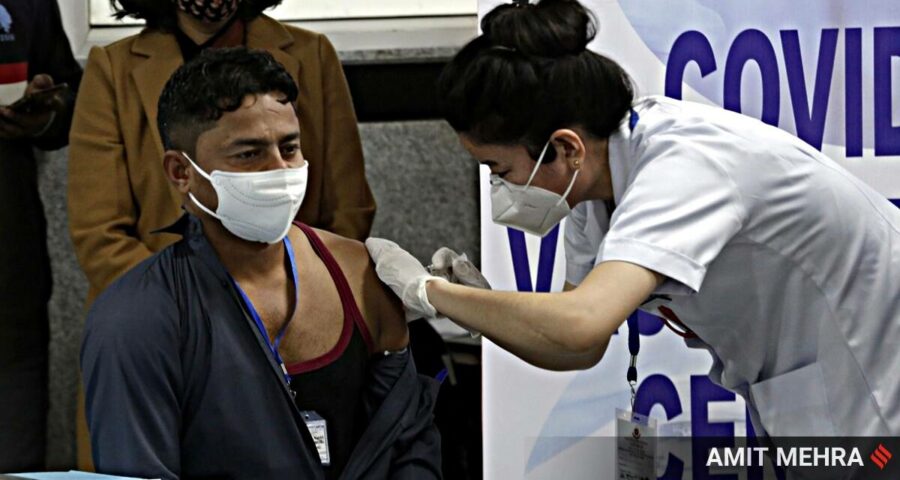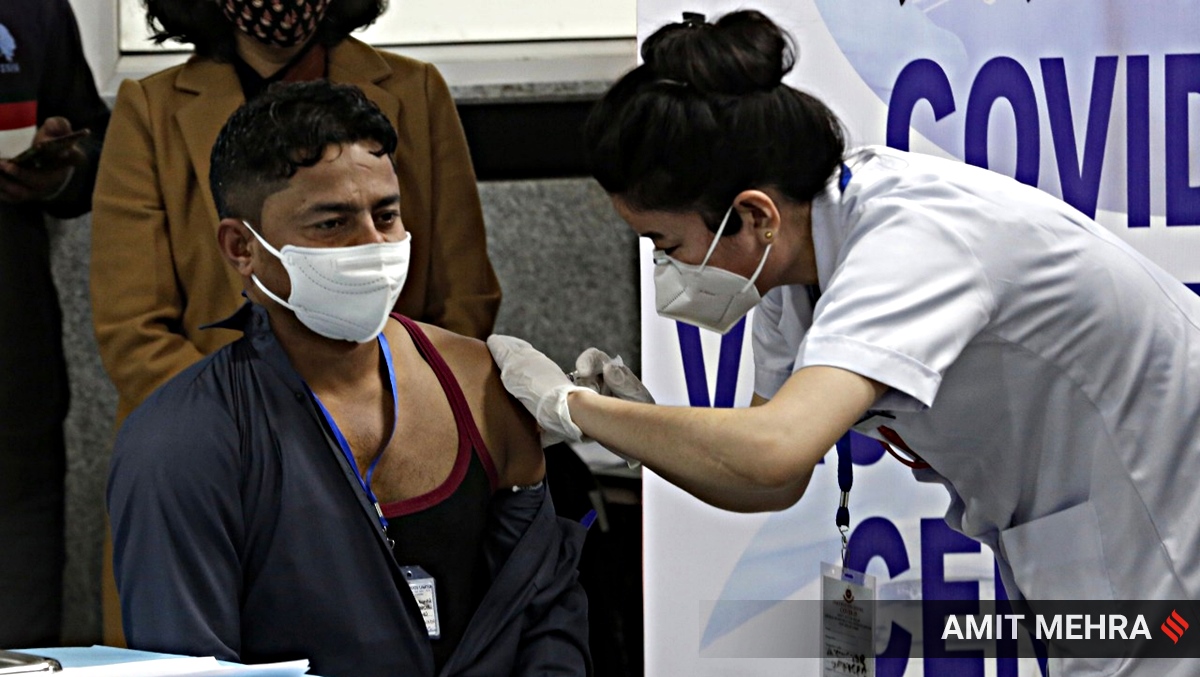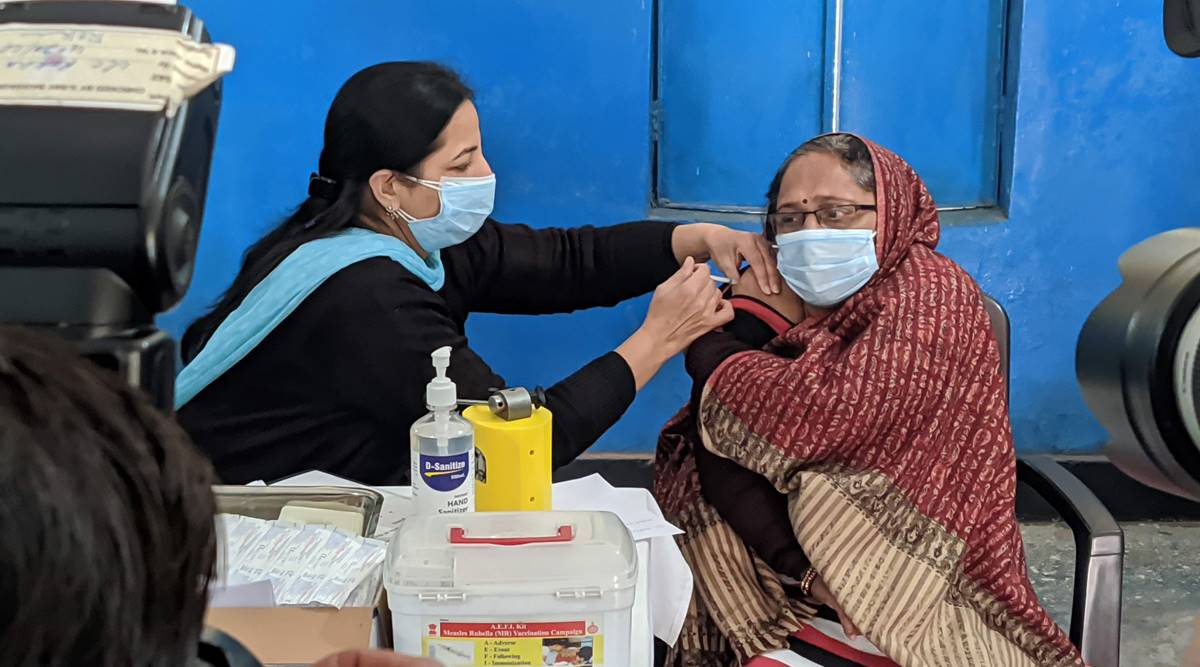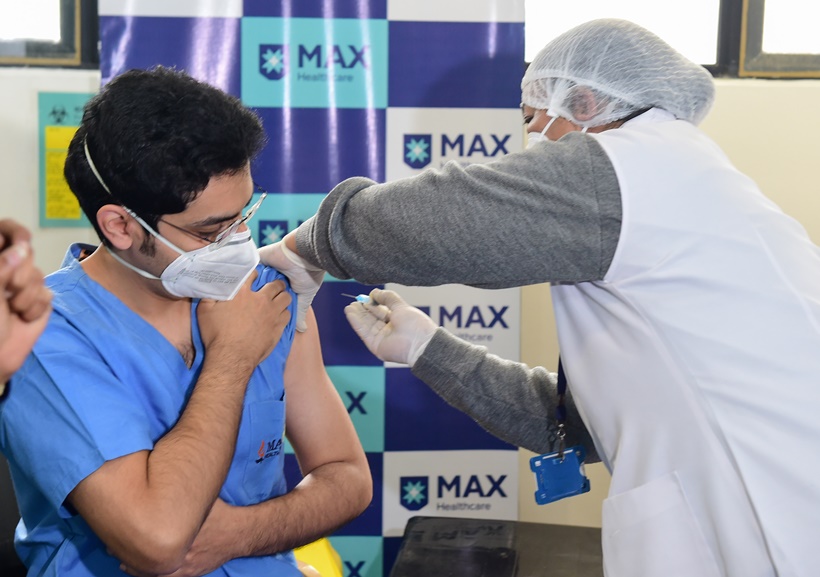Vaccine shots of both Covishield and Covaxin were used in Delhi's inoculation drive that took place at 81 centres across the capital.
In a blizzard of popping flashbulbs, with Health Minister Dr Harsh Vardhan looking on, 34-year Manish Kumar took his arm out of the sleeve of his grey sanitation worker’s uniform to become the first person to receive the vaccine against the novel coronavirus at the All India Institute of Medical Sciences (AIIMS) in the capital on Saturday.
Around noon, emerging from the observation room half an hour after being administered the shot, Manish announced that he felt fine.
“It was a good experience. I thought there might be some itching or some kind of discomfort, but I feel good,” he said.
As India launched the most ambitious vaccination drive in its history, 100 beneficiaries were administered doses at each of the 81 inoculation centres in Delhi.
Both vaccines cleared for emergency use by the regulator, Covishield and Covaxin, were used in Delhi. Covaxin, the indigenous vaccine developed by Hyderabad-based Bharat Biotech, was given to recipients at AIIMS and at five other centres.
At the other 75 vaccination centres in the capital, Covishield, the Indian variant of Oxford-AstraZeneca’s AZD1222 vaccine, manufactured under licence by Serum Institute of India, was administered.
Beneficiaries at AIIMS on Saturday included the Director of the institute, Prof Randeep Guleria, NITI Aayog member and head of the high-level national committee on vaccine administration, Dr V K Paul, senior doctors who have been part of various Covid-19 task forces, young resident doctors, nurses, faculty members, and administrative staff.
On Covaxin, which is still in phase 3 clinical trials, Prof Guleria told The Indian Express: “We all know that the data is very robust as far as safety and immunogenicity is concerned. Many vaccines, even in the past, have been given emergency use authorisation, considering the situation. We need more doses and more vaccines.”
Prof Guleria underlined the practical necessity of getting on with the vaccination process widely and quickly.
“If we stick to the robust data, we should vaccinate as many people as possible because we need to reduce mortality and break the chain of transmission, get the economy back,” he said. “At the same time, we should also be cognizant of the fact that vaccine research is an ongoing process and there are still four-five vaccines in India which are undergoing trials. It is possible you may find a better vaccine of third or next generation, which may be given in only one shot or require only nasal spray.
“Those things are evolving, but in the current situation, we must try and take what we have and as things change, we will evolve. But if we keep waiting that once we have the best vaccine, we will miss the boat. In a pandemic, you have to move with what brings down mortality and the number of cases,” Prof Guleria said.
Dr Paul said that the safety of Covaxin was not in doubt, and urged people to have faith in the scientific process.
“Phase 3 trial for Covaxin is going on. But remember, even in the case of Pfizer and Moderna, the phase 3 trial is still going on. If you look at the data, you find that the benefits are overwhelming compared to the occasional risk. That is why the whole world has decided to move forward and take the benefit,” Dr Paul said.
“Above all, what is important at this stage is whether you’re safe or not. The safety is proven without doubt… please embrace it. That is why it is emergency use authorisation. We should respect scientific processes that have unfolded in extremely difficult and unusual circumstances. But scientific frameworks allow it and it will be taken to its logical conclusion. Today, two great vaccines are available. Whatever vaccine you are given, please take it with pride and happiness,” he said.
Covaxin was given, besides AIIMS, at five other central government hospitals – Safdarjung, Ram Manohar Lohia (RML), Kalawati Saran Children’s Hospital, and two ESI hospitals.
RML Hospital Medical Superintendent Dr A K Rana said the vaccines were based on “rock-solid science”, and doubts and suspicions over them were unfounded.
“As far as I, as a medical professional, am concerned, the two vaccines are manufactured in a scientific research lab, by experts,” Dr Rana said. “This technique of developing the vaccine has not come up overnight – the manufacturing of vaccines has been happening for decades. These techniques are in place, which have evolved over time. Suspecting or doubting, as far as I am concerned, is probably ill-founded. I have decided that I will take this vaccine myself.”
Like Dr Rana, Dr N N Mathur, Medical Director of Lady Hardinge Medical College, also got the Covaxin shot.
At AIIMS, the first recipient, Manish Kumar, said: “I feel good that I was part of the first few people to get the vaccine, and hopefully people won’t be afraid to take it.
“When I found out that the vaccine was going to be given, I approached my bosses and said that I hoped I would get it early so I could continue to work without the fear of Covid that has stayed with us every day for the last many months… We were motivated by our authorities, who told us that there was nothing to fear,” Manish said.
Manish has been working at AIIMS for over seven years now. He lives with his wife and his parents; his mother too, is a sanitation worker at AIIMS.
Nursing officer Dhaval Dwivedi received the shot right after Manish, followed by Prof Guleria and Dr Paul.
“I am feeling very proud and humbled that I am part of the first day of the vaccine programme, and I think it’s important for us to understand that we have to motivate people to come forward to get vaccinated. I wanted to lead by example, and that is why I volunteered to get myself vaccinated on the first day,” Prof Guleria said after receiving the shot.
For Dr Puneet Misra (52), professor of community medicine, the arrival of the vaccine is the successful culmination of a long journey – and one that he hopes will finally allow him to meet his family whom he has not seen since the beginning of the pandemic.
“I have been involved in the fight against Covid-19 from day one, as a member of a central task force and a rapid response team. A lot of my friends had apprehensions about my safety, since I was visiting all the hotspots. But as an epidemiologist I knew the precautions that need to be taken – and it had to be done to control the situation,” Dr Misra said.
“My wife and daughter are doctors working in the US, and since we’ve been so busy, and with our vacations cancelled, we haven’t met since the pandemic began. With the situation stabilising, maybe we can start making plans now,” he said.
Dr Misra’s wife and daughter too have been vaccinated in the US. “All three of us have received different vaccines. My wife received Pfizer’s, my daughter got Moderna’s, and I’ve got Covaxin,” he laughed.
Dr Vikas H (34), of the department of hospital administration, recalled the challenges from early days of the outbreak in the city. “I was in charge of the Covid testing facility in AIIMS. Once people were tested, we had to call them and inform them if they were positive, and that was difficult because people often responded with a lot of fear and emotion.
“At that time, it was mandatory for Covid-positive people to be admitted to hospital and it was often difficult to persuade them to do so,” he said.
Dr Vikas lives with his wife near AIIMS, but has not met his wider family in Karnataka since the pandemic began. “Forget going to meet them, I don’t think I’ve been able to even leave AIIMS because of the workload. Hopefully once a large number of people get vaccinated, this will change,” he said.
Dr Roshan Matthew (29), a senior resident in the emergency medicine department, emphasised that all safety precautions would continue to remain important even after the first dose of the vaccine had been administered.
“Since we are yet to take the second dose of the vaccine, we can’t be sure of safety yet, and we will continue to take all precautions. But I do feel hopeful. I live in the AIIMS hostel and was finally able to meet my family in Chhattisgarh after eight months in December. In our department, we have been on our toes round the clock since the beginning,” he said.
(With Ananya Tiwari)
Source: Read Full Article




